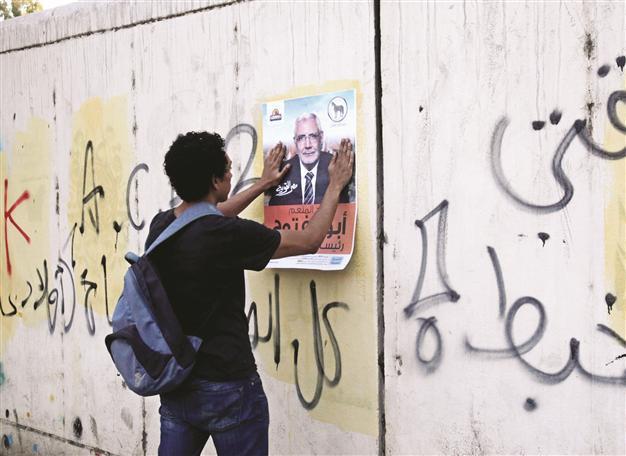Egypt steps up for democracy
CAIRO

A supporter of presidential candidate Abdel-Moneim Abolfotoh places a poster on a wall on the street during a presidential rally in Cairo. Around 50 million voters are eligible to cast ballots in elections. REUTERS photo
Egypt is heading into a landmark presidential
election today which will end six decades of military rule in the country.
The 13 candidates in the election include Islamists, liberals and two with military backgrounds, among them a retired air force commander who was Mubarak’s last prime minister. The main contenders are former foreign minister and Arab League chief Amr Moussa; Ahmed Shafiq, the last premier to serve under Mubarak; the Muslim
Brotherhood’s Mohammed Morsi, and former Brotherhood member and independent Islamist Abdel-Moneim Abolfotoh. No outright winner is expected to emerge from the two-day vote, so a runoff is scheduled for June 16 and 17 between the two top finishers.
The election has pitted Islamists against secularists and revolutionaries against members of the former regime, and for the first time in the country’s history, the outcome is unknown. Sketchy opinion polls taken by a government-funded think-tank and the cabinet’s research division show Morsi trailing behind Abolfotoh, Moussa and Shafiq. The election is also seen as the last stop in a turbulent transitional period before the generals hand back power by July 1, as they promised soon after Mubarak was ousted in last year’s 18-day popular uprising.
Accept the outcome: armyAround 50 million voters are eligible to cast ballots, and a massive security plan is under way. Interior Minister Mohammed Ibrahim said that security forces would be deployed at polling stations around the country, particularly at the 351 centers to which ballots will be taken for counting. Just moments before the deadline for the “campaign silence” began on May 20, Islamic Brotherhood candidate Morsi warned against any attempt to tamper with the presidential election at a rally attended by thousands of supporters.
Moussa held a final press conference saying support was increasing for his campaign, days after Abolfotoh held a festive final rally in Cairo promising to unite Egyptians. The Supreme Council of the Armed Forces (SCAF), which took charge after Mubarak’s ouster, has pledged a fair election and has promised to hand power over to civilian rule once a new leader is elected.
The SCAF stressed “the importance of accepting the results of the election, which will reflect the choice of the free Egyptian people,” in a statement posted on its Facebook page.
Prime Minister Kamal al-Ganzuri also called on Egyptians to “stand together to ensure the success of the electoral process and to accept the decision of the majority of Egyptians, who will express their will through the ballot boxes.”
Compiled from AFP and AP stories by the Daily News staff.
